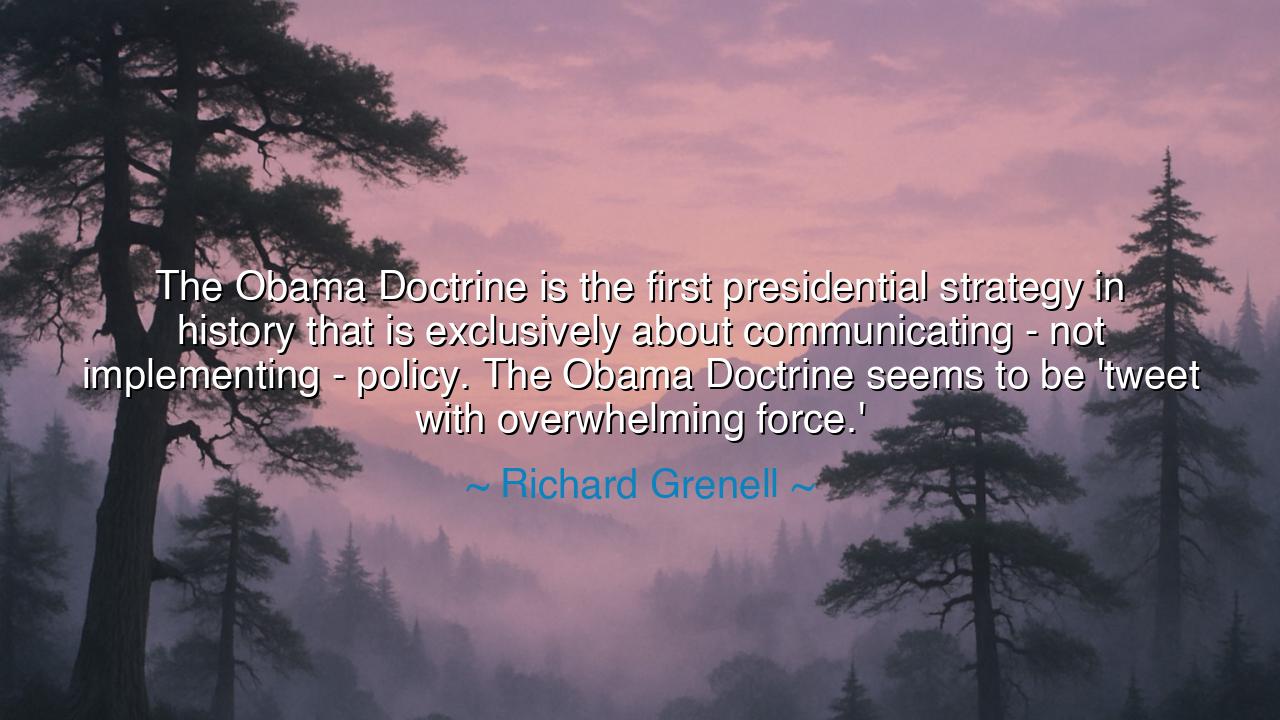
The Obama Doctrine is the first presidential strategy in history
The Obama Doctrine is the first presidential strategy in history that is exclusively about communicating - not implementing - policy. The Obama Doctrine seems to be 'tweet with overwhelming force.'






“The Obama Doctrine is the first presidential strategy in history that is exclusively about communicating — not implementing — policy. The Obama Doctrine seems to be ‘tweet with overwhelming force.’” Thus spoke Richard Grenell, diplomat and political commentator, with words that ring as both criticism and revelation. His statement, sharp as a blade, cuts into the heart of a modern paradox — the triumph of communication over action, of image over substance. It is a lament of an age in which power speaks loudly, but acts slowly; in which the word, once a prelude to the deed, has become its replacement. In this saying, Grenell captures not only a moment in politics, but a truth about the shifting nature of leadership itself — that in the age of constant attention, the power to communicate may eclipse the will to govern.
When Grenell speaks of the Obama Doctrine, he refers to the guiding principles of President Barack Obama’s approach to foreign policy — diplomacy over aggression, consensus over confrontation, persuasion over imposition. Yet Grenell, as a critic, sees in this doctrine not a refinement of leadership, but a dilution of it. He accuses the strategy of being built upon words rather than deeds, of seeking victory not on the battlefield or in policy chambers, but in the arena of perception. To “tweet with overwhelming force” is to fight with rhetoric instead of resolve — to rely on the strength of message rather than the might of implementation. It is a poetic yet piercing metaphor for the age in which nations shape their power not through action, but through narrative.
The origin of this quote lies in the political climate of the early twenty-first century, when technology and media had transformed the very nature of governance. Presidents, kings, and ministers once ruled through laws and decrees; now they rule also through screens and words. Grenell, a veteran of diplomacy, saw this transformation with wary eyes. He understood that communication had become a weapon — one capable of inspiring, deceiving, or pacifying entire populations. Yet he feared that the weapon had replaced the armor — that leaders had begun to mistake the appearance of power for power itself. His words, therefore, are not only an attack on a single administration, but a warning to all who live in an age where messaging becomes the policy.
This is not a new danger. History is filled with rulers who mastered the art of speech but failed in the art of action. Consider Demosthenes, the great orator of Athens, whose words once stirred a nation to resist the advance of Macedon. His speeches were magnificent, his rhetoric divine — yet his people did not follow through with the courage to act, and thus Alexander’s empire rose, and Athens fell. So too in Rome, eloquence became an empire’s sedative; as the senators spoke endlessly of virtue and destiny, their armies crumbled and their republic died. Words are powerful — but when they become a substitute for courage, they become chains rather than wings.
And yet, Grenell’s statement, though cutting, hides a deeper truth. For in the modern world, communication is itself a form of warfare. A tweet can spark a revolution; a speech can calm a nation or shatter its peace. To master communication is to master perception, and perception often precedes reality. The challenge, then, is not to reject the power of speech, but to reunite it with action. Words must once again become the servants of deeds, not their masters. For a message without follow-through is like thunder without lightning — loud but powerless.
Grenell’s warning therefore carries a lesson for all generations: do not confuse expression with accomplishment. Whether in politics, art, or daily life, speaking of virtue is not the same as living it. The world does not change through statements alone; it changes through sacrifice, effort, and endurance. The modern man, surrounded by the noise of social media and endless commentary, must remember that wisdom lies not in how loudly one proclaims, but in how faithfully one acts. The true leader is not the one who wins the argument, but the one who moves the world forward, quietly if need be, with resolve and purpose.
So let the words of Richard Grenell stand not merely as criticism, but as counsel. In every age, there will be doctrines built on speech — policies wrapped in promises, leaders who mistake communication for command. But history’s enduring heroes are those whose deeds outlast their declarations. Be therefore one whose words and actions walk side by side. Speak truth, but also live it. Communicate hope, but also create it. For the world will not be saved by those who talk of change, but by those who — having spoken — lift their hands and build.






AAdministratorAdministrator
Welcome, honored guests. Please leave a comment, we will respond soon